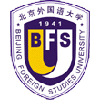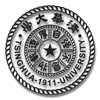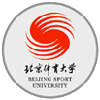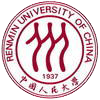Tsinghua University
Established in 1911, Tsinghua University (THU) is one of the most reputable
and famous
Tsinghua University has established stable bilateral exchange and cooperation ties with many universities, colleges, research institutes and enterprises all over the world. The university has made a conscious effort to offer a world-class curricular system and top-notch teaching content and methods, so as to cultivate its students' ability and creativity. Additionally, it has placed great importance on providing state-of-the-art teaching and research facilities. Currently, Tsinghua University enrollment has exceeded 25,000 students, among whom 1,000 are foreign students from over 50 countries.
At present, foreign students from all over the world have enrolled under various undergraduate, Masters and Doctoral programs. Many have also taken part in the Chinese language programs offered by the University. Chinese language programs are offered in 4 weeks, 8 weeks, 12 weeks, 1 semester and one year duration of study. The main courses are listening, speaking, writing, grammar and reading Chinese magazines and newspapers.
Foreign experts are often invited to do research, give lectures or attend international conferences. More than 10,000 foreign visitors, including university presidents, senior government officials, famous public figures and CEOs of large companies visit Tsinghua University each year; and many overseas scholars and experts are invited to teach and participate in joint research projects. Simultaneously, the university also sends faculty members and graduate students abroad to conduct joint research, study or attend conferences. Tsinghua University's Chinese Learning Center for Foreigners (TUCLCFF), supervised by the School of Humanities and Social Sciences, is responsible for teaching Chinese language and culture to foreign students. This specialized teaching institute has 46 faculty members, of which 10 are full or associate professors, 22 are lecturers, and 14 are assistants. All of the teachers are certified to teach Chinese language and culture to foreigners. In fact, quite a number of them have even been abroad to teach Chinese, participate in research, or for academic exchange. Devoted to teaching, the teachers also research how to continuously improve teaching methodologies. Since 1987, TUCLCFF has trained nearly 3,400 students from over 50 countries.
Library The University Library was first built in 1919. After two major expansions, the library now has a floor space of 38,500 square meters and a collection of 3.38 million volumes of books, 14,000 kinds of electrical journals in Chinese and English, over 180 databases and thousands of audio and video materials. Sourcing of materials has been made easier through an efficient document and information service system. The library also provides both domestic and international online retrieval of information services for readers. Construction of the new five-floor library was completed in 1991. The design project was a cooperative effort between the Research Institute of Architectural Designing and the Architectural School of Tsinghua University. Rising through the center of the 20,000-plus square meter library is a four-story catalog hall. In addition to more than 20 rooms of books on a variety of specialties, there are smaller reading rooms, exhibition and lecture halls, and many comfortable lounge areas. To retain the unique style of the original building the new library was built with red bricks and blue tiles, but instead of duplicating the numerous arched windows in the old library, the new library has only a few arched gates outside its entrances. The new library has won many top awards, including First Prize in the National Architectural Design Competition in 1993. Recreation Facilities The gymnasium, distinguished for its historic and cultural value, has been one of the most beloved spots on campus for generations of Tsinghua graduates. It has been a gathering place for the most outstanding people in the field of physical education, producing thousands of talented athletes to represent China. The gym was constructed in two stages. The front hall, with its Western Classic architectural style, was built from 1916 to1919. The back hall was built from 1931 to 1932, and followed the same design style. When it was founded, the gym was one of the most advanced of its kind in the country. It houses a basketball court, suspension athletic track, and various kinds of athletic equipment. It now has an indoor swimming pool, which was used by former Chairman Mao Zedong after the liberation of China. Laundry There are washing facilities in the international student dormitories. Students can buy machine-coins to use these machines. For those who require a dry cleaning service, a laundromat can be found on campus. Money & Banking The university has numerous ATMs, including those for the Bank of China, Industrial and Commercial Bank, Agriculture Bank, and Construction Bank. Within 15 minutes walking distance, there is an Industrial and Commercial Bank of China. The bank accepts all of foreign currencies, and international students can open accounts. Medical Care A Chinese clinic is available on campus; students can bring their ID card to see the doctors. An International hospital, the SOS Clinic, is located in Chaoyang District and provides 24 hours services. It has comprehensive medical services including dentistry, counseling, physiotherapy, occupational therapy, nutrition and TCM (Traditional Chinese Medicine). An on-site pharmacy stocks Western medication and TCM ingredients. Clinic appointments can be made by calling (8610) 6462-9112, and dental appointments at (8610) 6462-0333. Food & Groceries The university has many dining halls providing Chinese food for Chinese and international students. Off-campus and within walking distance, there are many restaurants that offer Japanese, Korean, Chinese and Western cuisine. Some grocery stores are available on campus selling various food, drink, snack, daily use and household items. A Watson's and Lotus supermarket are within 5 minutes walking distance, and Wal-Mart and Carrefour are located within 10-15 minutes by car. Postal Services A post office is located on the first floor of the international students building. Students can send and receive mail and packages from all over the world. It also offers post-office boxes, envelope and stamps.
Considered one of the nicest dorms in Beijing, Tsinghua University offers on-campus dormitory accommodation based on single occupancy for international students. The dorm rooms are equipped with a single bed, desk and chair, TV, telephone, private bathroom, air-conditioning and 24 hours hot water. The costs of outgoing telephone calls and internet usage are to be paid by students.
Tsinghua University is located in northwestern Beijing, just outside the Fourth Ring Road, in Haidian district. Situated on several former royal gardens of the Qing Dynasty, the university is surrounded by a few historical sites, including the Summer Palace, which is located near the university's west gate. Tsinghua University is 16 kilometers away from Tian' anmen Square and the Forbidden City, 37 kilometers away from the Capital Airport, 18 kilometers away from the Beijing Railway Station and 12 kilometers from the Beijing West Railway Station. From the airport to the university: 1 hour by car From the train station to the university: 30 - 45 minutes by car |

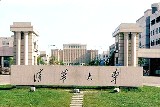 universities in China. Originally called "Tsinghua School", the university was renamed National Tsinghua University in 1928. The university sits on the "Tsinghua Yuan" site, a former imperial garden of the Qing Dynasty. A comprehensive multi-disciplinary university, Tsinghua University is recognized as a world-class institution for both education and research, with strong disciplines in science, engineering, management and humanities. Over the decades, Tsinghua University has trained numerous students. Many Tsinghua University graduates have become recognized and outstanding scientists, engineers, entrepreneurs and senior government officials, making great contributions to society.
universities in China. Originally called "Tsinghua School", the university was renamed National Tsinghua University in 1928. The university sits on the "Tsinghua Yuan" site, a former imperial garden of the Qing Dynasty. A comprehensive multi-disciplinary university, Tsinghua University is recognized as a world-class institution for both education and research, with strong disciplines in science, engineering, management and humanities. Over the decades, Tsinghua University has trained numerous students. Many Tsinghua University graduates have become recognized and outstanding scientists, engineers, entrepreneurs and senior government officials, making great contributions to society.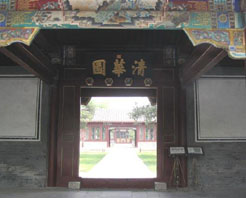 Tsinghua University covers an area of 3.8 square kilometers and has more than 50,000 people and students living on campus. The garden-like landscape, with the Wanquan River meandering through, has inspired and motivated generations of students. Tsinghua University offers a friendly and comfortable environment for international students to practice their Chinese, join in the many student activities, and make new friends from all over the world. With twenty-four hour security, the campus is a safe place to be, day or night.
Tsinghua University covers an area of 3.8 square kilometers and has more than 50,000 people and students living on campus. The garden-like landscape, with the Wanquan River meandering through, has inspired and motivated generations of students. Tsinghua University offers a friendly and comfortable environment for international students to practice their Chinese, join in the many student activities, and make new friends from all over the world. With twenty-four hour security, the campus is a safe place to be, day or night.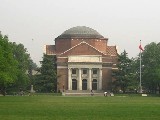 Tsinghua University is comprised of 13 schools, 48 departments, 47 research institutes, 28 research centers, 15 national laboratories, and 23 postdoctoral research stations. The university also has a Graduate School, as well as a School for Continuing Education. The University offers bachelor degrees in 46 specialties, Master's degrees in 139 specialties and PHD degrees in 107 specialties. Tsinghua University welcomes international students. Since the adoption of the opening up policy in China, the number of foreign students has also greatly increased and is continually rising.
Tsinghua University is comprised of 13 schools, 48 departments, 47 research institutes, 28 research centers, 15 national laboratories, and 23 postdoctoral research stations. The university also has a Graduate School, as well as a School for Continuing Education. The University offers bachelor degrees in 46 specialties, Master's degrees in 139 specialties and PHD degrees in 107 specialties. Tsinghua University welcomes international students. Since the adoption of the opening up policy in China, the number of foreign students has also greatly increased and is continually rising.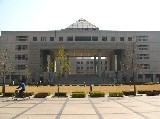 Tsinghua University has received high prestige for its distinguished faculty members, professors and scholars. With a splendid legacy accumulated over the past 90 years, Tsinghua has retained its character and charm while promoting rigorous research, ensuring academic and educational prestige in China and abroad. At present, the University has over 7,100 faculty and staff members, among whom 900 are professors and 1,200 are associate professors.
Tsinghua University has received high prestige for its distinguished faculty members, professors and scholars. With a splendid legacy accumulated over the past 90 years, Tsinghua has retained its character and charm while promoting rigorous research, ensuring academic and educational prestige in China and abroad. At present, the University has over 7,100 faculty and staff members, among whom 900 are professors and 1,200 are associate professors.